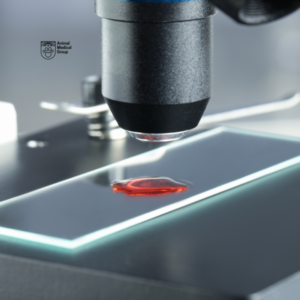
Our in-clinic labs and diagnostic tools offer timely, affordable, and reliable answers for your pets well-being, providing you with peace of mind. Our comprehensive clinical pathology services utilize AI-assisted cutting-edge lab equipment for accurate and efficient biochemistry analyses, complete blood counts, and cytology tests.
Lab Testing
Our lab can conduct these tests in-house:
- Analysis for Addison’s Disease and Cushing’s Disease (Hyperadrenocorticism and hypoadrenocorticism)
- Pancreatic lipase tests for pancreatitis assessment in felines and canines
- Kidney and Liver Disease
- Infections
- Cancers
- Diabetes
- Hormonal Problems
- Parvovirus and FIV/FeLV testing
- Heartworm and Tick fever testing
- Cardiac testing for heart disease
- Thyroid testing to assess hyperthyroidism in cats and hypothyroidism in dogs.
Cytology
Cytology is the microscopic examination of cells collected from the body. We examine surface samples from your pet’s skin or deeper tissues and lumps using a technique called FNA (Fine needle aspiration).
All our samples are analyzed using AI imaging techniques. If necessary, our board-certified pathologists will add additional details via our virtual laboratory. All samples are processed in-house, making cytology more affordable and allowing for a quicker turnaround time for results.
When is cytology performed?
Cytology is often used to diagnose the nature of ‘lumps and bumps’ on the body’s surface. However, cytology can also be used to evaluate:
- internal organs, such as the liver, lungs, lymph nodes, and kidneys
- body fluids, such as joint fluid
- abnormal accumulations of fluids (called effusions), especially in the chest and abdomen
- various surfaces of the body, both external and internal (e.g., mouth, eyes, breathing passages, skin or vagina)
What information can cytology provide?
Cytology can tell us whether a problem is caused by inflammation or by neoplasia (abnormal tissue growth). If there is inflammation, cytology can often identify the underlying cause. If the sample appears neoplastic, cytology can usually determine which type of tissue is involved and whether the neoplasm is malignant (cancerous) or benign.

Urinalysis
Urinalysis is a routine test that reports urine’s physical and chemical properties.
What do we use it for?
Urinalysis assesses the health of the kidneys and urinary system and can also reveal problems in other organ systems. It is important for diagnosing metabolic diseases, such as diabetes mellitus. Urinalysis is a valuable test in healthy and sick animals and should be included in any comprehensive evaluation of a pet’s health. If your pet’s urinary behaviours change, a urinalysis can help identify the cause.
How is a urinalysis performed?
There are four parts to a urinalysis.
- Assess appearance: colour and turbidity (cloudiness).
- Measure the concentration (also known as the specific gravity) of the urine.
- Measure pH (acidity) and analyze the chemical composition of the urine.
- Examine the cells and solid material present in the urine using a microscope.
Most of the analysis is done on whole urine (as it comes from the animal), but the microscopic examination of cells and solid material requires the sample to be concentrated or sedimented.
To do this, urine is placed in a tube and then centrifuged (spun in a circle at very high speed) to force the cells and solid material to settle to the bottom. This accumulated material, or sediment, is collected, spread on a slide, and examined under our AI microscope.

Blood Tests
The importance of blood tests for pets
Pets, unable to communicate when they’re unwell, make health monitoring essential. While regular vet visits and a good diet are important, they may not reveal internal organ function. Blood tests provide vital insights into your pet’s health and well-being, empowering you to take proactive steps in their care.
What do blood tests reveal?
Blood tests assess organ performance, immune function, and disease presence comprehensively. They help evaluate the liver, kidneys, pancreas, and identify potential health issues. Analysing red and white blood cells can indicate hydration, anemia, and infections, providing a thorough understanding of your pet’s health.
When do pets need blood tests?
Blood tests are versatile tools that can be used for pre-anaesthesia evaluations, disease screenings, and monitoring medication effects, showcasing their wide applicability in different health scenarios.
How often should pets be tested?
Testing frequency depends on age and health. Annual screenings are recommended as pets age much faster than humans.
How are blood tests done?
Blood tests can be performed during regular vet visits. A small amount of blood is taken from a shaved area and sent for analysis. Pets typically experience minimal discomfort.
If you have concerns about your pet’s health, especially as they age, consider scheduling an appointment with the Animal Medical Group. Remember, regular blood tests are a key part of your pet’s well-being.


We want you to know that your pet is in good hands with our veterinary team.
Request an appointment online or call us 242 698 7387

